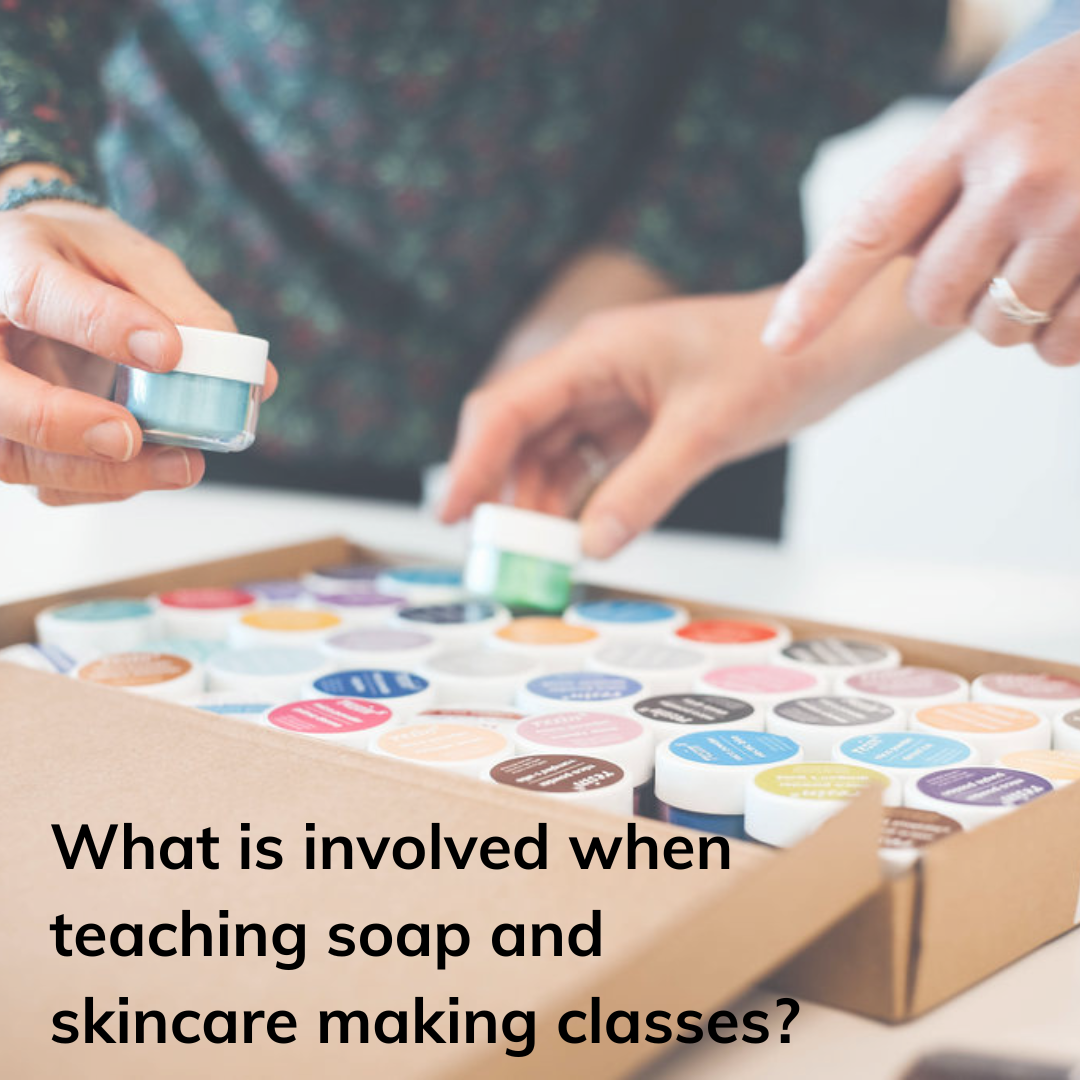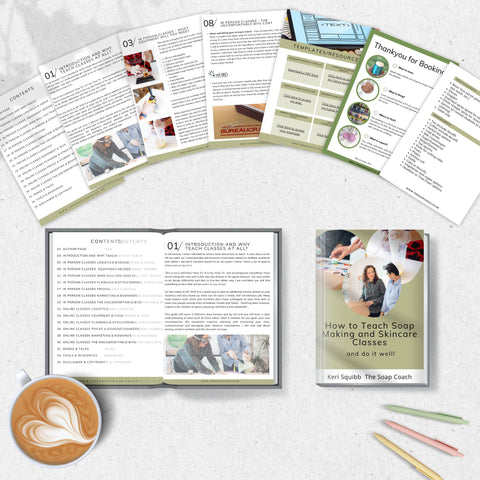A Guide to Teaching Soap Making and Skin Care Classes.

A guide to teaching soap making and skincare classes.
Are you a soap and skincare product maker who wants to add an extra income stream to your business by teaching classes? If so, you might be wondering how to get started and what is involved. Read on and I will give you a quick overview.
Why Teach Soap Making and Skincare Classes?
Teaching is an great way to share your passion and expertise with others while adding an extra income stream to your business. It's also incredibly fulfilling to witness your students create their own delightful products and relish the entire journey. Moreover, teaching can break the monotony of working solo as a soap maker, opening doors to new connections and networking opportunities within the community.
Exploring Class Formats
There are three primary class formats you can consider, in-person, online, and demonstrations. Each has its unique advantages and challenges, along with distinct requirements for planning, equipment, and marketing. Here's a brief overview of each format.
In-Person Classes
These are the most popular among students, offering a hands-on and interactive learning experience. In-person classes can take place at your home, workshop, or in rented external venues. You'll need to handle logistics like space, access, parking, facilities, insurance, and stock up on equipment and materials for each student. Whether you prefer group or one-to-one sessions depends on your availability and preference.
Online Classes
Online classes provide convenience and flexibility for both you and your students, accessible from anywhere with an internet connection. They can be live or recorded, depending on your chosen platform. Ensure you have quality webcam, microphone, lighting, and reliable Wi-Fi for smooth delivery. You will also need to think about recordings and how your students will access those - and for how long they will be available. Like in-person classes, online sessions can also be offered in group or one-on-one settings.
Demonstrations
Demonstrations offer a more informal teaching approach where you showcase product-making without direct student participation. This format is ideal for events and meetings where you can attract an audience. You will need to think about portable display of your products and equipment and ensure everyone can see and hear you.
Topics and Content to Teach
The topics you teach depend on your expertise and interests. You can cover everything from basic soap making to advanced techniques like swirling and layering. Additionally, consider teaching how to make other skincare products like lip balms, body butters, scrubs, lotions. The depth of content will depend very much on your students, the aims and objectives of the class and to a degree your teaching style. Most importantly bear in mind that everyone who attends your classes will have a variety of learning styles and also absorb information at all different speeds. The ability to quickly recognise how each of your students learn is a great attribute.
Planning and Structuring Your Classes
Effective planning and structuring are vital for successful teaching. You don't want your classes to be so rushed that your students feel overwhelmed and neither do you want them sat around bored whilst you try to fill a day with a class that could have been a half day session. Create a clear lesson plan outlining topics and steps for each class. Ensure your classes are engaging, informative, enjoyable, and tailored to your students' needs. They are not looking to just learn something new but to enjoy the whole experience too.
Pricing Your Classes
Finding the right pricing strategy can be challenging. Factor in costs such as raw materials, equipment, venue, insurance, marketing, and your time both before, during and after the class. Consider the value you offer students in terms of skills gained and support provided to strike a balance between covering costs and making a profit.
Marketing and Booking Strategies
Effective marketing is essential to attract students and fill your classes. Utilise social media, email, word-of-mouth, local groups, and notice boards to promote your classes. Write descriptions highlighting class benefits and use testimonials from previous classes. Provide secure booking and payment options, along with a fair cancellation policy. Post booking - communication is really important.
Handling Challenges Gracefully
Teaching may encounter bumps along the way, including cancellations, complaints, allergies, accidents, or mistakes. Be prepared with plans and processes to resolve issues professionally. Maintain a positive and adaptable attitude to navigate different situations and personalities.
In closing, I hope this blog post has equipped you with valuable information and tips for teaching soap making and skincare classes.
If you are keen to learn more, I've created a comprehensive eBook pulling everything I have learnt over the last few years together, including
- How to choose the best format, venue, and equipment for your classes
- How to structure your lessons, and create your handouts
- How to price your classes, market your services, and take bookings
- How to handle the health and safety aspects, insurance, and cancellation policies
- How to teach online classes using Zoom or other platforms
- How to do demonstrations and talks for different audiences
You can find out more here. This guide is packed with practical advice, templates, resources, checklists, and more to help you create outstanding classes that delight your students and elevate your business. Happy teaching.

Leave a comment